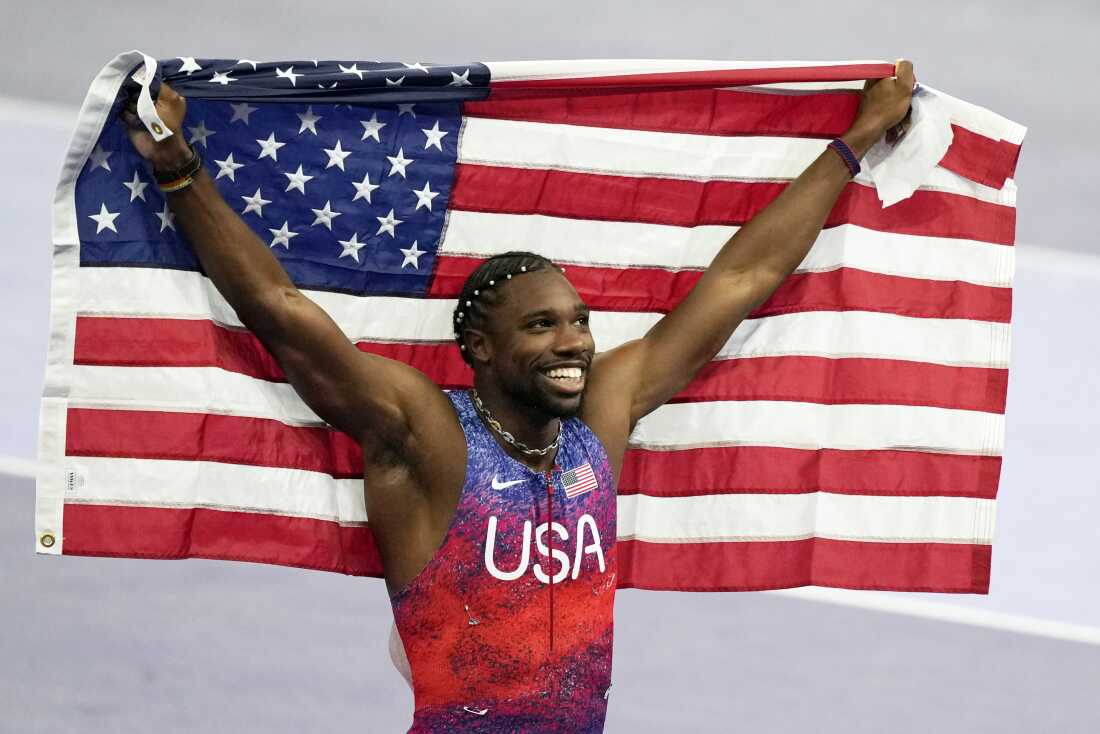Noah Lyles, the reigning Olympic 100m champion, faced an unexpected and formidable challenge at the Paris 2024 Olympics. Just days before competing in the men’s 200m final, Lyles tested positive for COVID-19. Despite the physical toll the virus took on his body, Lyles demonstrated remarkable resilience, determination, and sheer willpower as he fought through the illness to secure a bronze medal in one of the most anticipated races of the Games.
Lyles, known for his explosive speed and charismatic presence on the track, had high hopes for the 200m event. However, those hopes were nearly derailed when he began experiencing symptoms of COVID-19 early on Tuesday morning. “I woke up feeling chills, aching, sore throat—those were a lot of the symptoms I’ve had before when getting COVID,” Lyles later recounted. Recognizing the familiar signs, he immediately sought testing, and his positive result confirmed his worst fears.
Faced with the reality of competing while sick, Lyles had a difficult decision to make. The athlete in him, driven by years of training and a deep love for competition, wanted to race despite the diagnosis. “I still wanted to run,” Noah said. After consulting with the medical team, it was determined that he could still compete, albeit with caution. He was quickly quarantined in a hotel near the Olympic Village, where he received medication and support from the U.S. team’s medical staff to manage his symptoms and prepare his body for the race.
The 200m final was a true test of Lyles’s physical and mental endurance. He stepped onto the track knowing that he wasn’t at full strength, yet determined to give everything he had. His competitors, including Botswana’s Letsile Tebogo and U.S. teammate Kenneth Bednarek, were in peak condition and eager to capitalize on any weakness Lyles might show.
From the start of the race, it was clear that Lyles was fighting an uphill battle. His usual explosive acceleration was tempered by the fatigue and discomfort caused by the virus. Yet, despite these challenges, Lyles remained focused, drawing on his extensive experience and competitive spirit to stay in the race. As the athletes rounded the curve and entered the home straight, Lyles dug deep, refusing to give in to the physical toll the virus was taking on his body.
In the end, Lyles crossed the finish line with a time of 19.70 seconds, securing the bronze medal. Tebogo claimed the gold with a blistering time of 19.46 seconds, while Bednarek took silver, clocking in at 19.62 seconds. Lyles’s time was not what he had hoped for, but under the circumstances, it was a remarkable achievement. The American sprinter had managed to place on the podium despite battling an illness that would have sidelined most athletes.
After the race, he was visibly exhausted. He was seen being wheeled off the track, raising concerns about his condition. Later, while wearing a mask and flanked by members of the U.S. team’s medical staff, he addressed the media. He spoke candidly about his experience leading up to the race, his COVID-19 diagnosis, and the challenges he faced during the competition. “I was quite lightheaded after that race, and the chest pain was definitely active,” he admitted. “After a while, I was able to catch my breath and get my wits about me. I am feeling a lot better now. It definitely affected my performance.”
Lyles’s decision to compete, despite knowing the risks and challenges, sparked a broader conversation about the responsibilities and risks associated with competing while ill, particularly during a global pandemic. Some praised Lyles for his bravery and determination, while others expressed concern about the potential health implications. However, for Lyles, the decision to race was deeply personal. “I am more proud of myself than anything. Coming out and winning the bronze medal after three days with COVID—it has been a wild Olympics,” he reflected.
Lyles’s performance in the 200m final, while not the gold-medal finish he had aspired to, was a testament to his incredible mental strength and dedication to his sport. It was a reminder that, even in the face of adversity, the human spirit is capable of extraordinary feats. Lyles’s journey at the Paris Olympics, marked by resilience and determination, will be remembered as one of the most inspiring stories of the Games.
As he looks ahead to future competitions, his experience in Paris will undoubtedly shape his approach to the sport. The challenges he faced and overcame will serve as a source of motivation, driving him to continue striving for excellence on the track. Noah Lyles’s bronze medal at the Paris 2024 Olympics was more than just a podium finish—it was a symbol of perseverance, courage, and the unyielding will to compete at the highest level, no matter the odds.


